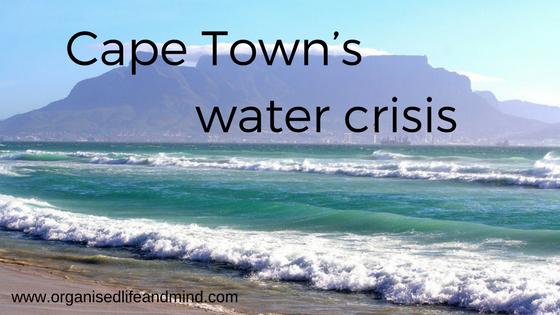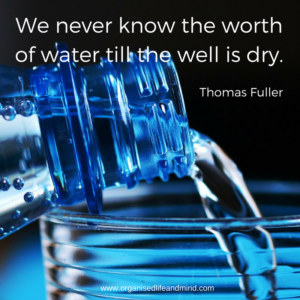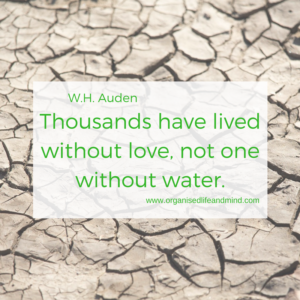How the water crisis affects one family
The water crisis in Cape Town, South Africa, is all over the news. Over the last few weeks, “Day Zero” was mentioned more frequently. It’s the day when Cape Town would have to shut off most of its water systems. These are frightening news, especially for someone who like me lives in the desert. If this can happen in Cape Town, it can certainly hit my desert home! We’ve asked our beloved reader Heidi Maggot who lives with her family of 5 what it’s really like to live in Cape Town now.
For those of you who aren’t too familiar with Cape Town, it has beautiful beaches, some even with ridiculously cute penguins, and faces mountains on the other side. It’s a wonderful city with friendly people. It’s regarded an employment hub for South African and immigrants from other African states. As such, it’s grown to over 4 million people (an increased by 1.5 million people between 2001-2013 alone) while the infrastructure may not be capable of supporting these increasing demands. The growth in population, poor planning and climate changes are just some of the causes for the water crisis.
For Heidi and her family, the situation hasn’t changed much recently. The drought began a few years ago and they’ve been asked to make small changes then already. One, which makes perfect sense as it also avoids burning the grass is to only water the garden on certain days before 10 am and after 5 pm. The “official’ drought started in 2015, she explains.
Heidi, how has the crisis change over the last few weeks for you?
Every few months, the level of water restrictions changed [it was level one in 2005]. We’ve been asked to lower the amount we use while the tariff we paid kept increasing. Level 6B was introduced in February this year.
We are now being asked to use less than 50 litres per person per day, which can be a challenge [that is one-sixth of what the average American uses]. The 50 litres includes flushing, washing, drinking. The latest rates are R29.93 (USD 2.52) per kilo-litre for water and R25.63 (USD 2.16) per kilo-litre for sewerage (which is calculated as a percentage of the water used). I don’t know how that compares to the rest of the world but when you are earning South African Rands, it is a lot of money.
I realised at the end of 2017, that it would be more severe than we expected. That is when the expected “day zero” was announced. The day that the water was expected to run out if we didn’t change our water usage habits.
Having no water available is difficult to imagine for us. What saving tips did you receive and from whom?
The local council have been utilising their Facebook and Twitter accounts to make people more aware of water restrictions and savings options. There have been articles in the local newspapers and on TV as well. Some of my ideas came from the Water Shedding Facebook page and some are common sense.
My daughter (who is 7) came home and explained that they learned at school that we all have to use less than 50 litres of water per day and that we need to re-use our grey water.
How did you and your family decide on what changes to make?
My husband was working in Egypt last year, so most of the changes were implemented by me, slowly doing one thing then another, with him adding on to these when he was on a home rotation. The kids have been super helpful as well.
What are some of the changes have you made?
It has been summer here in Cape Town and that means swimming season. On swimming days, my children did not shower. That was one way of saving water. We stopped filling the pool completely and have our front gutter rerouted into the pool in the hopes that it will rain and fill the pool (it’s half full at present).
I cut off the downpipes at the back of the house and collect that water for watering some plants and for mopping the house and toilet flushing. The water at the toilet cistern is turned off and we fill the cistern using collected rain water or collected bath/shower water. It sounds gross but we don’t flush every time we use the toilet. My kids came home telling me “if its yellow let it mellow, if its brown then flush it down!”
We don’t have luxurious baths anymore, my children still enjoy a bath every now and again, so they use about 10-15 cm of water in the bath, otherwise its short 2-minute-showers. Once we have wet ourselves then we turn off the taps to soap and then turn on again to rinse off.
We collect any water that we use to rinse fruit and veg, and also hand washing water. My washing machine hose is redirected to outside where I either collect it to use for flushing toilets or for watering plants.
We no longer wash our cars the conventional way, and most commercial car washes are now water free. Many people buy bottled water as they do not believe the low water levels are safe for drinking, but that just adds to the worldwide plastic problem. We still drink tap water and are still healthy 😉
I still do not feel as though I am doing enough to conserve water.
What was the biggest surprise when you made these changes?
My mom lives with us and her not bathing every day was a big deal. She alternates between a basin wash and a bath every other day.
My son is absolutely loving not having a daily bath, while my daughter is less impressed.
My biggest surprise was how well my hair coped with only being washed twice a week!
Are there some changes you think you can and/or will continue once the crisis is over? Or is living with a crisis the new norm?
I think living with the water crisis is the new norm. It is all such habit now. It is a precious resource and we are all much more aware of how much we waste.
We live in an old house with original bathrooms and the cisterns are huge (14 litres per flush). Redoing the bathrooms has always been the plan as they’re very 70’s, with green tiles and matching tiled in soap dishes. When we do eventually redo them, I plan on having a grey water system put in, where the shower and basin water is put through a filter, drains into a tank and gets pumped into the cistern. I do not want any clean water going through my toilets at all. And even though I would love one, we will most likely only put in showers, no baths.
We also want to get some 1000 litre tanks to collect rainwater. We tried to sink a well point but unfortunately the groundwater levels have been depleted and we were unable to access any.
What tips do you have for people in other parts of the world?
Tips for people in the rest of the world. That’s a tough one. It’s hard to be conscious of things unless you are directly affected.
Well, the most basic one would be to say good bye to baths, and shower instead. That saves a LOT of water. I think this would be the easiest one for most people to start implementing. Also, take shorter showers. They don’t have to cut them back as drastically as we all had to, but just cutting back by one minute saves plenty.
Install aerators to taps, this allows more air and less water to come through without changing how well you can wash. [I had to look up these “aerataros” and realised I used them in Europe and the US before].
There are many other saving tips such using wipes etc, but those aren’t environmentally friendly either, so it’s not something I would advise. Lastly, as a tip from my children: if its yellow, let it mellow! If its brown, flush it down!
It’s been such a pleasure to hear Heidi’s perspective. A BIG THANK YOU, HEIDI! It brings the topic so much closer to home and as she outlined, there are so many ways each and everyone of us can do something TODAY.
In this household, the water is turned off when shampooing the hair, soaping up the body or brushing the teeth. Putting a brick in your toilet cisterns can also reduce the flushed amounts. Re-use the water to boil your vegetables or cook your pasta for your plants. In this region, we see many garden hoses leaking. Fix them and save some cash, too!
What’s your habit that you’ll change today to start saving more water?
Until next time,
Agni



